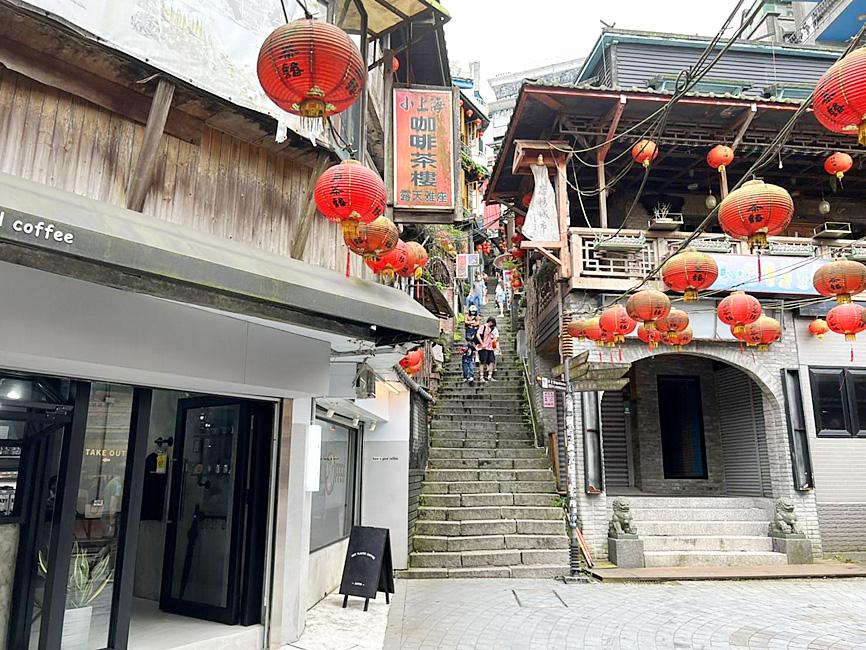A group of 25 Japanese tour operators is to arrive in Taiwan on Sunday next week for a four-day tour, as Taiwan prepares to reopen its borders amid signs that the COVID-19 pandemic is easing, Ministry of Transportation and Communications sources said yesterday.
It would be the first group of foreign nationals to enter Taiwan for tourism-related purposes since foreign tourist arrivals were banned on March 19, 2020.
The tour operators are to visit the Taipei 101 skyscraper, New Taipei City’s Jiufen (九份), Keelung’s Heping Island Park (和平島公園) and other sites in the city, including the former site of a kimono store run by the great-grandfather of Japanese Prime Minister Fumio Kishida, the sources said.

Photo courtesy of the New Taipei City Government via CNA
The tour operators would also ride a sightseeing restaurant bus in Taipei, which would stop at the Sun Yat-sen Memorial Hall where the Taiwan Lantern Festival is to be held next year, the sources said, adding that they would also meet with local tour operators and Tourism Bureau officials.
They would be exempt from the COVID-19 prevention policy of three days of isolation followed by four days of self-disease prevention, the sources said.
However, measures would be in place to prevent them from coming into contact with local residents, the sources said.
Plans to invite tour operators from other countries for similar tours are under way as part of the government’s preparations to reopen Taiwan to international tourists, the sources said.

EUROPEAN TARGETS: The planned Munich center would support TSMC’s European customers to design high-performance, energy-efficient chips, an executive said Taiwan Semiconductor Manufacturing Co (TSMC, 台積電), the world’s largest contract chipmaker, yesterday said that it plans to launch a new research-and-development (R&D) center in Munich, Germany, next quarter to assist customers with chip design. TSMC Europe president Paul de Bot made the announcement during a technology symposium in Amsterdam on Tuesday, the chipmaker said. The new Munich center would be the firm’s first chip designing center in Europe, it said. The chipmaker has set up a major R&D center at its base of operations in Hsinchu and plans to create a new one in the US to provide services for major US customers,

The Ministry of Transportation and Communications yesterday said that it would redesign the written portion of the driver’s license exam to make it more rigorous. “We hope that the exam can assess drivers’ understanding of traffic rules, particularly those who take the driver’s license test for the first time. In the past, drivers only needed to cram a book of test questions to pass the written exam,” Minister of Transportation and Communications Chen Shih-kai (陳世凱) told a news conference at the Taoyuan Motor Vehicle Office. “In the future, they would not be able to pass the test unless they study traffic regulations

GAINING STEAM: The scheme initially failed to gather much attention, with only 188 cards issued in its first year, but gained popularity amid the COVID-19 pandemic Applications for the Employment Gold Card have increased in the past few years, with the card having been issued to a total of 13,191 people from 101 countries since its introduction in 2018, the National Development Council (NDC) said yesterday. Those who have received the card have included celebrities, such as former NBA star Dwight Howard and Australian-South Korean cheerleader Dahye Lee, the NDC said. The four-in-one Employment Gold Card combines a work permit, resident visa, Alien Resident Certificate (ARC) and re-entry permit. It was first introduced in February 2018 through the Act Governing Recruitment and Employment of Foreign Professionals (外國專業人才延攬及雇用法),

‘A SURVIVAL QUESTION’: US officials have been urging the opposition KMT and TPP not to block defense spending, especially the special defense budget, an official said The US plans to ramp up weapons sales to Taiwan to a level exceeding US President Donald Trump’s first term as part of an effort to deter China as it intensifies military pressure on the nation, two US officials said on condition of anonymity. If US arms sales do accelerate, it could ease worries about the extent of Trump’s commitment to Taiwan. It would also add new friction to the tense US-China relationship. The officials said they expect US approvals for weapons sales to Taiwan over the next four years to surpass those in Trump’s first term, with one of them saying